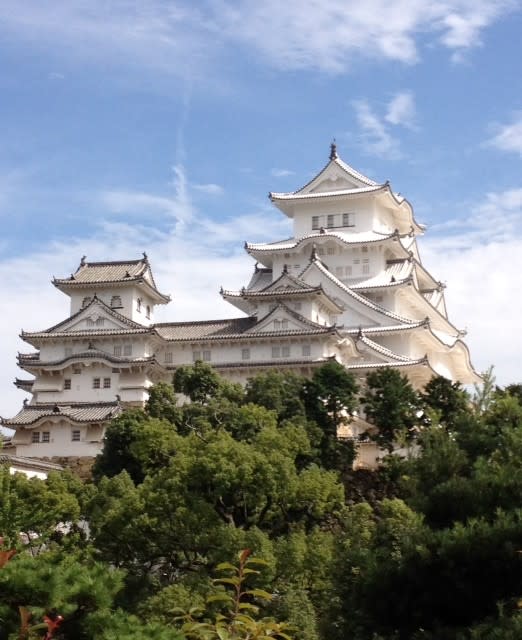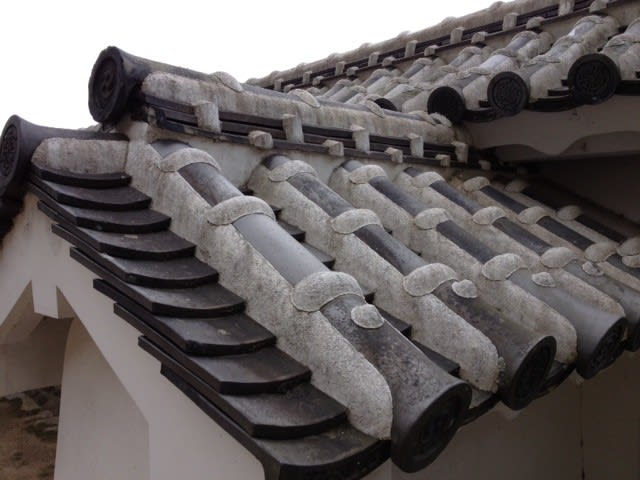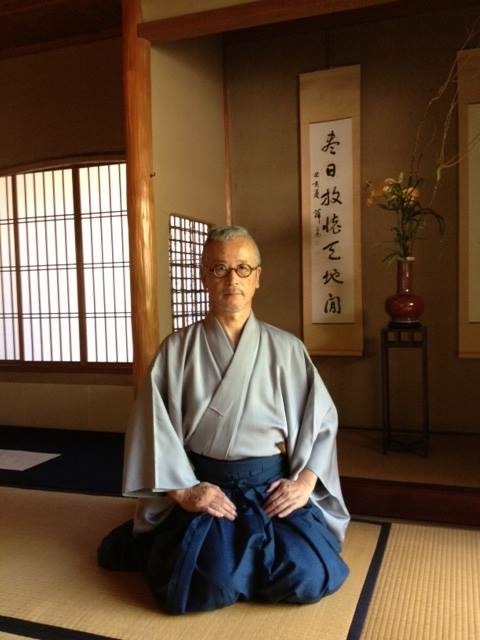東へ上れば京都「東山」、西に下れば播磨「姫路城」。
こんな言葉が、私の散策散歩の定番フレーズになっている。
私の仕事の都合で、昨年までは京都、姫路などに行くことが多かったため、この散歩コースが定番になっていった。京都は言うまでもなく大好きな街であるが、姫路は、平成の大改修で天空に浮くかの如く美しさを際立たせている姫路城の姿に惹かれ、姫路を訪れた際は、必ずと言っていいほど近くまで行き眺めては楽しんでいた。

掲載されている写真は2014年に行った時に撮った姫路城である。来年(2015年)の3月27日が姫路城大天守の改修のお披露目が行われると聞いている。今年(2014年)すでに大天守の覆いはとれ、秋空に浮いているかのように五重層の大天守は白く輝きをはなっていた。まさに「白鷺城(はくろじょう)」の復活であった。
白鷺城の由来は、資料によると「姫路城が「鷺山(ろざん)」に置かれているところから」、「白漆喰(しろしっくい)」で塗られた城壁の美しさから」、「ゴイサギなど白鷺と総称される鳥が多く住んでいたから」、「黒い壁から「烏城(うじょう)」とも呼ばれる岡山城との対比から」と諸説あるようだ。
また、一般の呼称では「白鷺城(しらさぎじょう)」と言われることが多いが、これにも諸説あるようだ。日本の城郭の異称は音読みするのが学術的には普通のようなので、「白鷺城(はくろじょう)」と呼ばれるようになった。

見るからに白い。遠目でみればなお白さが際立つ。屋根までが白く見える。屋根が白く見えるのは、瓦にも白漆喰が施されているからである。丸瓦の接合重ね部への目地漆喰の仕上げで、端部のひねり掛け(漆喰の上塗りの際の左官職人の技)を行っているから白が浮き出ている。面土漆喰(屋根台の土にあるがあたらないようにする)や鬼首漆喰(鬼瓦の付け根に塗る)などの瓦止めの機能のほか防水性をより強度にしている。
何百年の期間を耐えられるようにするための工夫が随所に施されている。これが歴史を築いていく材料や技である。その知恵の結晶が日本の独特の、絶妙なる美しさを生み出しているのだろう。

Go east to Kyoto "Higashiyama" and go west to Harima "Himeji Castle".
These words have become a standard phrase for my walks and walks.
Because of my work, I often went to Kyoto, Himeji, etc. until last year, so this walk course became a staple. Kyoto is, of course, my favorite city, but Himeji is attracted by the appearance of Himeji Castle, which stands out in the sky as if it were floating in the sky in a major renovation of the Heisei era. I enjoyed watching it as close as I could.
The photo posted is Himeji Castle, which I took in 2014. I heard that the renovation of the Himeji Castle Great Tower will be announced on March 27th, 2015 (2015). This year (2014), the large castle tower had already been uncovered, and the five-story large castle tower was shining white as if it were floating in the autumn sky. It was a revival of "Hakuro Castle".
According to the sources, Hakuro Castle is derived from "the place where Himeji Castle is located at "Rosen", "the beauty of the walls painted with white plaster", "Goisagi etc." It is said that there are many birds known as Shirasagi inhabited, and "From the comparison with Okayama Castle, which is also called "Ujo" because of its black walls".
In addition, it is often called "Shirasagijo" by the general name, but there are various theories about this. It is academically common to read the synonym of Japanese castle walls, so it has come to be called "Hakujo Castle".
It is white to see. The whiteness stands out from a distance. The roof looks white. The roof looks white because the roof tiles are also white plastered. The finish is a joint plaster on the joint stack of the round roof tiles, and the end is twisted (the technique of the plasterer when plastering the plaster), so white is exposed. In addition to the function of stopping roof tiles such as demonstrating that it does not hit) and demon neck plaster (painting on the base of the demon roof), it is made more waterproof.
There are many ways to make it last for hundreds of years. This is the material and technique that builds history. The crystal of that wisdom may have created the unique and exquisite beauty of Japan.



























※コメント投稿者のブログIDはブログ作成者のみに通知されます